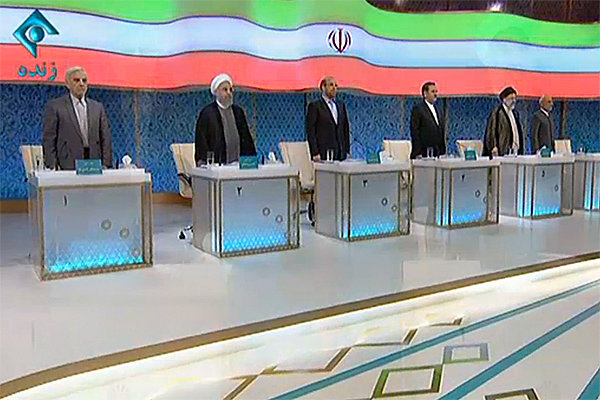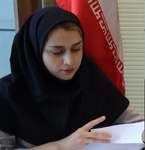The six candidates today are focusing on social issues during the 180-minute debate aired live on state television.
Chief Custodian of Astan Quds Razavi Ebrahim Raeisi, 1st VP Es'hagh Jahangiri, Tehran's Mayor Mohammad Bagher Ghalibaf, former Minister of Culture and Islamic Guidance Mostafa Mirsalim and former Minister of Physical Education Mostafa Hashemi Taba, as well as President Hassan Rouhani are the six candidates present in the live program to broadcast their campaign promises for May 19 presidential elections.
Mostafa Mirsalim was the first candidate who kicked off the debate responding to a question on his government's plans to manage marginalization.
He said the lack of attention to underserved regions has caused marginalization and immigration which in turn has resulted in security, economic and political problems.
He added that wrong population policies, lack of management in land and water use has caused an increase in marginalization and immigration.
Criticizing Mirsalim's view, Hashmi Taba said my first priority is to maintain the country's habitat; if we ignore issues of priority, what Mr. Mirsalim said will be at second hand.
Hassan Rouhani said unemployment and lack of sufficient income has caused people to seek marginalization in cities. "A person who lives in a city or village and his sources of income is not enough is forced to emigrate.
Jahangiri pointed to the scientific and professional confrontation with and organization of this phenomenon; "Dr. Rouhani's government has formed a council to recreate settlements according to the central and marginal contexts.
Raeisi was the second candidate to offer his views on promotig social justice and reducing gap between social classes.
He said planners and policy makers in a government must be in a way to reduce the gap and consequently the corruption, based on social justice. He criticized the common approach in developed nations, where some live in palaces and some in slums which is contrary to the social justice.
On the components of the housing problems and the plan to solve the isuue, especially for young couples, Hashemi Taba said the causes of problems in a society must be addressed and we should not consider only a certain class.
Responding to the issue of employment, Dr. Rouhani said Iran's business ranking declined from 152 to 120, indicating that business conditions and confidence to investment has increased in the country during the last four years.
Regarding the lack of client satisfaction in executive organs and the plans to reduce bureaucracy in offices, Jahangiri said during the 11th government, dominant approach to social issues was unique; authoritative, harsh and
judicia llook changed to the scientific one which highly regards ethics in management.
In response to a question on effective strategies and plans to deal with environmental issues, excessive water consumption, deforestation, and haze phenomenon, Ghalibaf said the serious economic problems has affected the social sphere causing environmental problems, including dust pollution.
Ghalibaf criticized the current government of being ignorant of the issue of pollution, saying "we held a joint meeting with the government and offered our initiative to resolve the problem; the government accepted the plan, but said they would run the plen themselves, but nothing happened."
On taking advantage of the elites for the country's future, Dr. Jahangiri said "today, our country enjoys a high rate of knowledge and one of the duties of vice-president for science and technology is to organize and take advantage of the elites of the country."
In a report recently received from international organizations, scientific rank of Iran is acceptable at regional and international level, Jahangiri added, noting that it is important to communicate with the country's manufacturing industry; "if research centers are based in production centers, we can better use of elite power."
Ghalibaf was the next candidate to touch upon his plans to increase the rate of population; he said the biggest opportunity for our country are young people, if we could not make balance toward the population growth then in 1400 we will have more old people than young population.
Meantime, Mir Salim offered his plans to solve the traffic problem. He said the use public transportation is preferable to personal facilities. "The use of public transportation, subway and buses, would reduce the time pople waste in traffic jam."
Regarding the women rights in taking over jobs, Dr. Rouhani said women's employment is a very important issue; "The government took an important step and created more jobs for young people and especially for women."
In recent employment announcement, 53 percent of women were successful in the tests for recruitment, he added.
The second presidential group debate will be held next Friday (May 5) and will focus on political issues followed by the third and last group debate which is slated for May 12 with the economic issues as its focal point.
LR


























Your Comment